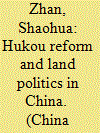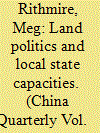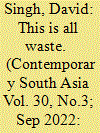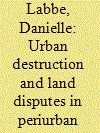|
|
|
Sort Order |
|
|
|
Items / Page
|
|
|
|
|
|
|
| Srl | Item |
| 1 |
ID:
128529


|
|
|
|
|
| Publication |
2013.
|
| Summary/Abstract |
Although the pluralist system of land tenure in Vanuatu does not directly discriminate against women, the operation of the system and contemporary interpretations of custom is increasingly marginalising women from the decision making processes regarding land management and control. Commitment to the principles of gender equality through constitutional guarantees and the ratification of relevant international treaty obligations, while providing a relevant legal framework for equality, have only had limited success in addressing discriminatory practices. This article analyses alternative ways to overcome the barriers faced by women that are currently under consideration in many Pacific island Countries, including recording and registration, as well as legal vehicles such as incorporating customary land groups, trusts and community companies. This article concludes that while both existing and proposed mechanisms have the potential to secure for women a greater role in decision making processes regarding land management and control, that potential will not be realised in the absence of knowledge, empowerment and the acceptance of the legitimacy of such rights
|
|
|
|
|
|
|
|
|
|
|
|
|
|
|
|
| 2 |
ID:
153538


|
|
|
|
|
| Summary/Abstract |
This article calls attention to the role of capital, large capital in particular, in recent reforms to China’s system of household registration (hukou). It argues that a tripartite alliance between agrarian capital, urban capital, and local governments arose in the first decade of this century and has become a major force driving locally initiated hukou reforms. The main goal of reform has been to facilitate the transfer of land rights from rural residents so that rural land could be used to generate profits and government revenue. While rural residents are compensated for the loss of land rights, many face increasing insecurity in their livelihoods. The article is based on an extensive survey of local policy documents and a case study of Chengdu Municipality in Sichuan Province.
|
|
|
|
|
|
|
|
|
|
|
|
|
|
|
|
| 3 |
ID:
124891


|
|
|
|
|
| Publication |
2013.
|
| Summary/Abstract |
Despite common national institutions and incentives to remake urban landscapes to anchor growth, generate land-lease revenues and display a capacious administration, Chinese urban governments exhibit varying levels of control over land. This article uses a paired comparison of Dalian and Harbin in China's north-east to link differences in local political economies to land politics. Dalian, benefiting from early access to foreign capital, consolidated its control over urban territory through the designation of a development zone, which realigned local economic interests and introduced dual pressures for enterprises to restructure and relocate. Harbin, facing capital shortages, distributed urban territory to assuage the losers of reform and promote economic growth. The findings suggest that 1) growth strategies, and the territorial politics they produce, are products of the post-Mao urban hierarchy rather than of socialist legacies, and 2), perhaps surprisingly, local governments exercise the greatest control over urban land in cities that adopted market reforms earliest.
|
|
|
|
|
|
|
|
|
|
|
|
|
|
|
|
| 4 |
ID:
162623


|
|
|
|
|
| Summary/Abstract |
The current configuration of global land politics – who gets what land, how, how much, why and with what implications in urban and rural spaces in the Global South and North – brings disparate social groups, governments and social movements with different sectoral and class interests into the issue of natural resource politics. Governance instruments must be able to capture the ‘political moment’ marked by the increasing intersection of issues and state and social forces that mobilise around these. This paper looks at whether and how the Voluntary Guidelines on Responsible Governance of Tenure of Land, Fisheries and Forests in the Context of National Food Security (also known as the TGs) passed in 2012 in the United Nations Committee for Food Security (CFS) can contribute to democratising resource politics today. This work puts forward some initial ideas about how systematic research into the TGs can be done more meaningfully.
|
|
|
|
|
|
|
|
|
|
|
|
|
|
|
|
| 5 |
ID:
186307


|
|
|
|
|
| Summary/Abstract |
Renewables are imagined in India around features of ‘greenness’ and ‘cleanness’ and are presented as the modern pathway towards sustainable development and unlimited growth. But this shining story entails problematic land politics and the related (un)making of space for capital accumulation: previous property regimes and land uses are erased while a new set of land technologies and territorial rules legitimates land dispossession and the private takeover of commons. Wind infrastructures are specifically targeting (common) lands categorized as ‘deserted’, ‘empty’ and ‘waste’, and subaltern groups (tribal, pastoral and Dalit communities) whose livelihood practices have been historically described as ‘unproductive’ and ‘backward’. These both violent and discursive logics of (neo)colonial and green energy land politics are mediated and fixed to the ground levels by powerful (land) brokers, contractors, wind companies’ land teams and political mediators who embark land on its tortuous, bureaucratic and yet material journey towards clearing, cleaning and holding value. This article offers perspectives from political geography and critical agrarian studies to understand the territorial process, the persistence of class-caste relations and the legacy of coloniality underlying the land politics of green energy development in borderland India.
|
|
|
|
|
|
|
|
|
|
|
|
|
|
|
|
| 6 |
ID:
106749


|
|
|
|
|
| Publication |
2011.
|
| Summary/Abstract |
This paper discusses the recent rise in land disputes in the rapidly urbanizing outskirts of Hanoi. It presents emerging social conflicts as resulting from a clash between the rules and practices of urbanization as devised and regulated locally by periurban people and the territorialization projects that municipal authorities and land developers try to impose on them. At the heart of these conflicts are expropriations of large tracts of periurban land by state-backed developers and the reforms of local institutions that facilitate this process. Using the case of a village recently annexed to the city, this paper examines how local people resort to contentious politics to resist this urban encroachment. The paper finds that groups of elderly villagers assumed a leading role in crafting and deploying acts and discourses of resistance, relying on state-promoted values to support their claim. It further suggests that, while periurban villagers acknowledge the necessity of integrating their locality into Hanoi's urban fabric and governance system, they rise up when this process threatens moral relationships inherited from the prerevolutionary and collectivization periods.
|
|
|
|
|
|
|
|
|
|
|
|
|
|
|
|
| 7 |
ID:
164415


|
|
|
|
|
| Summary/Abstract |
As urbanization continues to fuel land and property conflicts in rural China, shareholding has been promoted as a reform in property rights that would enhance bottom-up control in the governance of collective assets. The recent proliferation of community-based shareholding companies has been credited for giving villagers new identities as shareholders, which entitle them to vote, receive their share of collective profits, and elect the managers of their wealth. This paper critically appraises these reforms and offers a contrarian perspective to singular narratives of villager empowerment. While shareholding clarifies villagers’ rights of control, income and transfer in collective property, the effective exercise of such powers is often forestalled on the ground by the concentration of power in elite hands. To the extent that formal and informal constraints on cadre power remain tenuous, shareholding could function as a vehicle for the powerful to appropriate collective wealth rather than as a weapon of the weak.
|
|
|
|
|
|
|
|
|
|
|
|
|
|
|
|
|
|
|
|
|